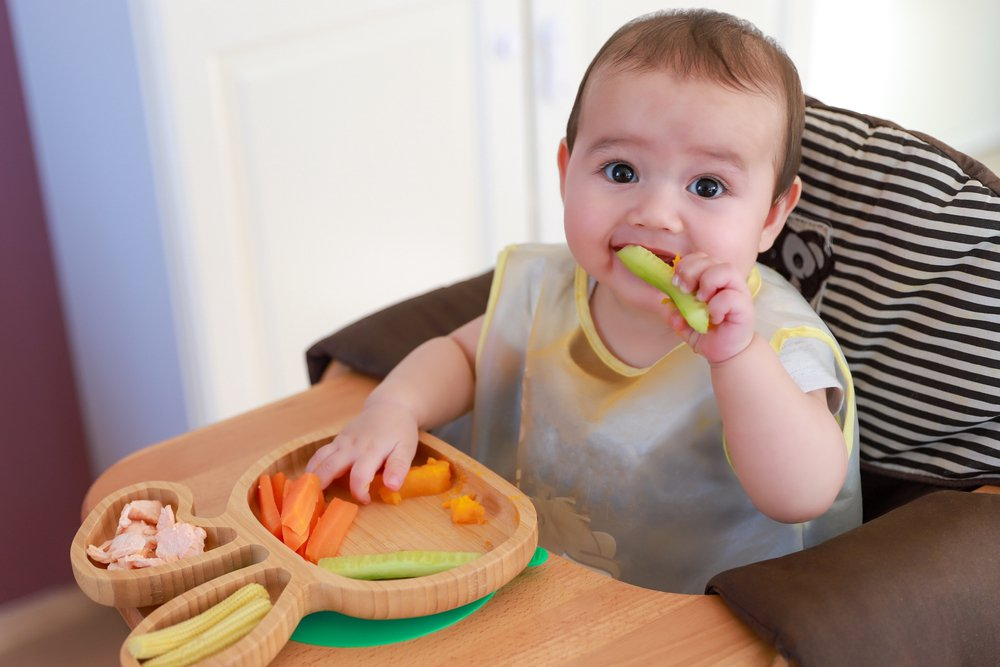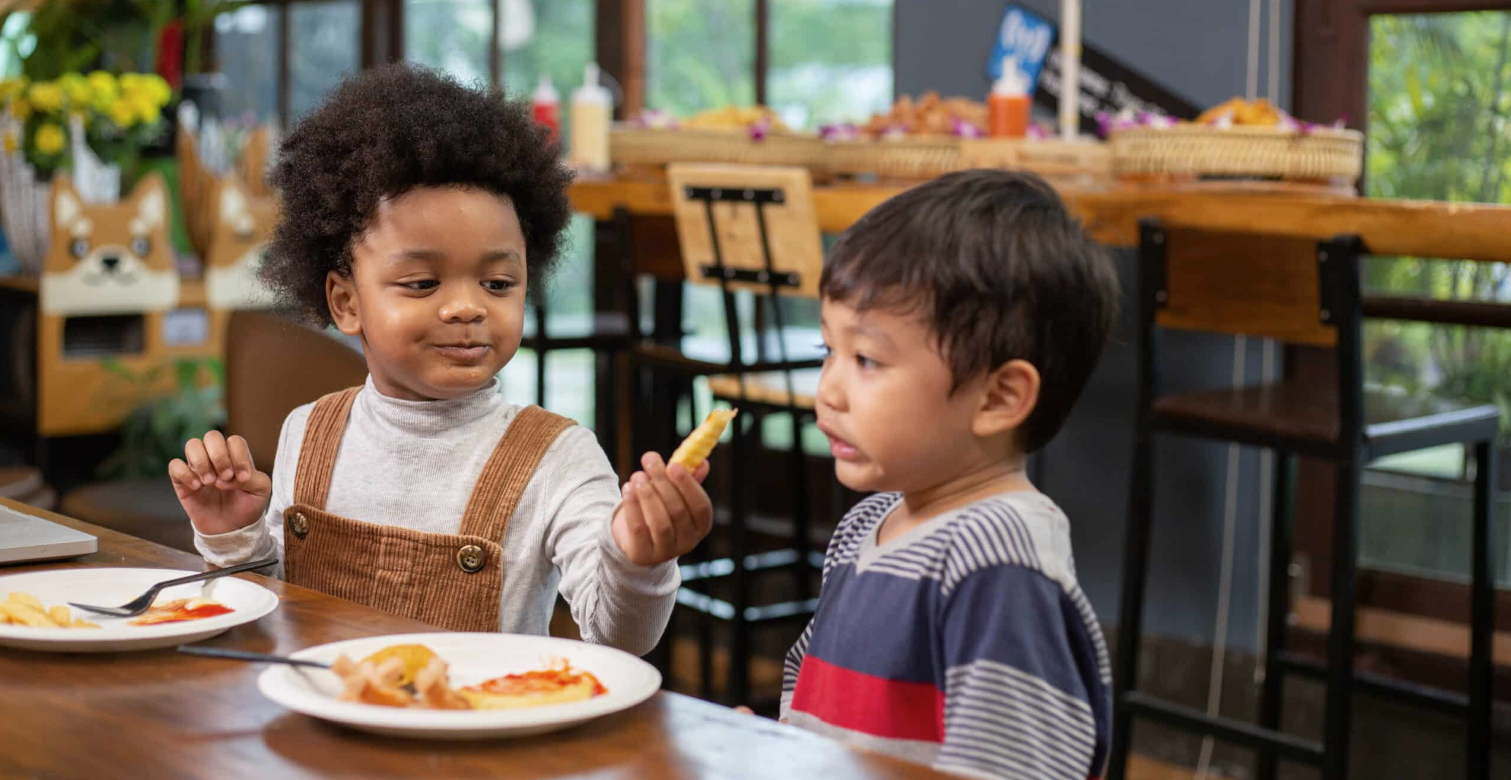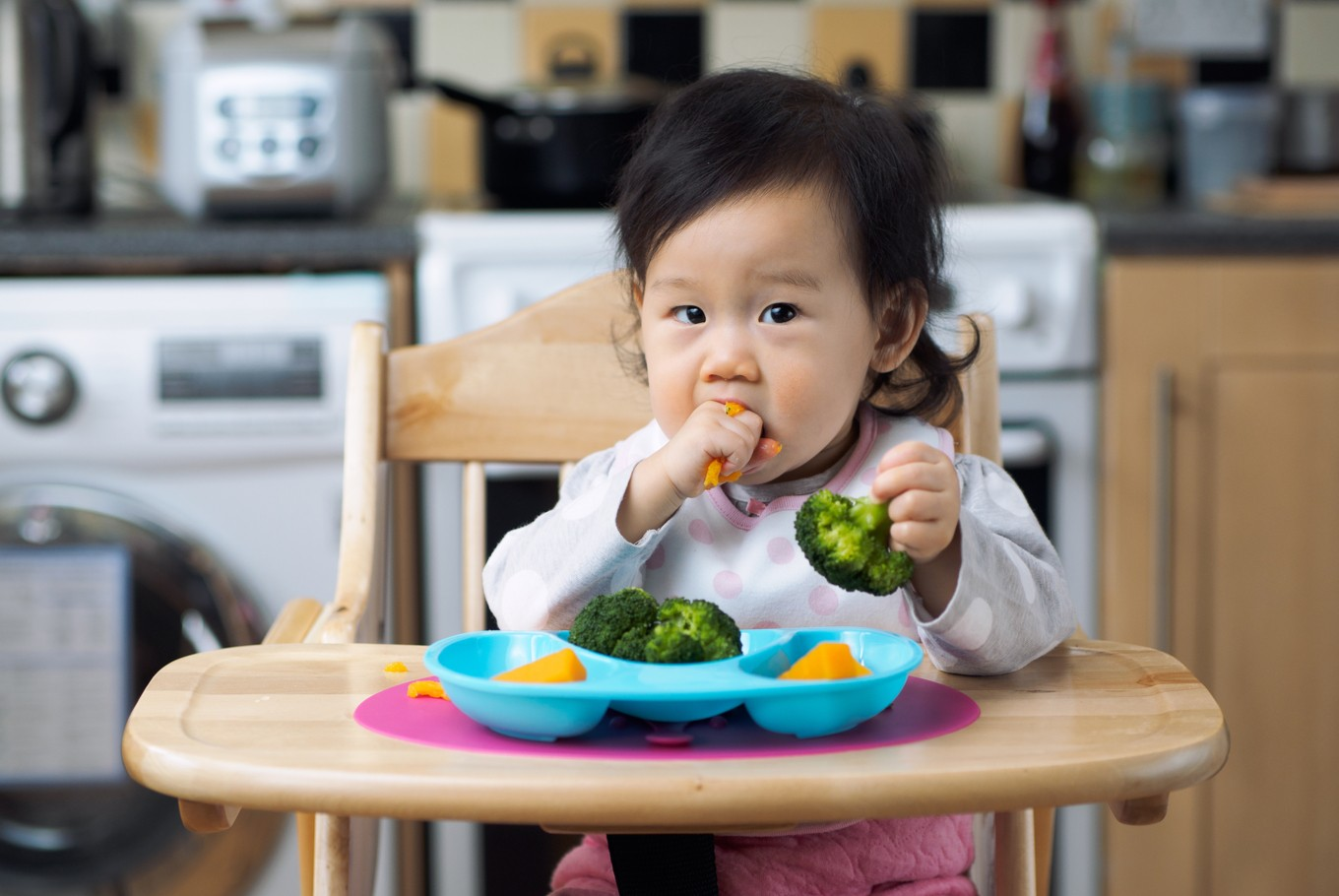If you are considering BLW for your baby, or have already started and are looking for support in the Houston area, you’re in luck! Houston has a vibrant parenting community with many resources available to help you navigate this exciting stage of your child’s development.
In this guide, we will explore what is BLW, its benefits and challenges, and provide information about Why BLW is a great choice for parents in Houston. We will also share some tips and resources to support you and your baby on this journey.
So, whether you are a new parent or have older children but are new to BLW, read on to discover all the ways Houston supports this popular feeding approach.
What is Baby-Led Weaning?

Baby-led weaning is a feeding method that encourages infants to self-feed solid foods from the very beginning of their introduction to solids. This approach is based on the belief that babies are able to regulate their own food intake and develop important oral motor skills by exploring and tasting different textures, flavors, and shapes of solid foods.
Traditionally, parents have started introducing solids to their babies by spoon-feeding them purees or mashed foods. However, BLW advocates argue that this method goes against a baby’s natural instincts and can lead to picky eating habits and aversions to certain textures in the long run.
With BLW, parents offer their babies a variety of safe, age-appropriate finger foods and let them choose what they want to eat and how much. This not only allows babies to explore different tastes and textures but also promotes independence and self-feeding skills from an early age.
Benefits of Baby-Led Weaning
There are several benefits associated with BLW for both the baby and the parents. Here are some of the notable ones:
- Promotes development: By allowing babies to feed themselves, BLW encourages the development of important motor skills such as hand-eye coordination and pincer grasp. It also promotes chewing and swallowing skills, which are crucial for speech development.
- Fosters a positive relationship with food: BLW gives babies the opportunity to explore different tastes, textures, and colors of foods at their own pace without pressure from parents. This can help prevent picky eating habits and aversions to certain foods in the future.
- Saves time and money: With BLW, there’s no need for parents to spend time making purees or purchasing special baby food products. This can save both time and money in the long run.
- Less mess and waste: While it may seem counterintuitive, BLW can actually result in less mess and waste than traditional spoon-feeding. This is because babies are able to self-regulate their food intake and choose what they want to eat, reducing the amount of food that ends up on the floor or thrown away.
- Encourages family meals: With BLW, babies are able to join in on family meals from the very beginning, promoting a sense of togetherness and socialization around food.
Step By Step Guide to Baby-Led Weaning
If you’re considering BLW for your baby, here are some general guidelines to follow:
Wait until your baby is developmentally ready
One of the key principles of BLW is to wait until your baby is developmentally ready to start solids. According to the American Academy of Pediatrics, most babies are ready for solid foods around 6 months of age. Some signs that your baby may be ready include being able to sit up unsupported, having good head and neck control, showing interest in food, and being able to bring objects to their mouth.
It’s important not to rush the introduction of solids before your baby is developmentally ready, as it can increase their risk of choking. It’s also important not to delay introducing solids for too long, as babies have increased iron and nutrient needs that cannot be met by breast milk or formula alone after 6 months.
Start with soft, easy-to-grasp foods
When starting BLW, it’s important to offer your baby soft and easy-to-grasp foods that are appropriate for their age. This can include cooked vegetables, fruits, small pieces of soft meat or fish, and well-cooked grains such as pasta or rice.
It’s also recommended to avoid offering honey, nuts, whole grapes, and other choking hazards. It’s important to cut foods into small, manageable pieces and to always supervise your baby while they are eating.
Encourage exploration and self-feeding
One of the main principles of BLW is to allow babies to explore food and feed themselves at their own pace. This means letting them touch, smell, and taste different foods without pressure or interference from parents.
It’s important to resist the urge to spoon-feed your baby or put food in their mouth for them. Instead, offer them a variety of safe and age-appropriate finger foods and allow them to choose what they want to eat and how much.
Introduce a variety of foods and textures
BLW encourages offering babies a variety of foods and textures from the very beginning. This not only helps them develop important oral motor skills but also exposes them to different tastes and flavors.
It’s important to offer a mix of fruits, vegetables, proteins, and grains to ensure a well-rounded diet. It’s also recommended to introduce new foods one at a time and wait a few days before introducing another new food to watch for any potential allergies or sensitivities.
Offer water alongside solid foods
Along with solid foods, it’s important to offer your baby water. This helps them stay hydrated and can also prevent constipation, which can be common when starting solids.
It’s recommended to offer water in an open cup or a sippy cup to promote drinking skills and avoid using bottles, which can cause tooth decay and impede speech development.
Allow your baby to decide when they’re finished eating
BLW advocates for letting babies self-regulate their food intake. This means allowing them to choose how much they want to eat and when they are finished with their meal.
It’s important not to pressure or force your baby to eat, as this can lead to aversions and negative associations with food. Instead, trust that your baby knows how much they need to eat and allow them to stop eating when they are full.
Be patient and trust the process
Starting solids can be a messy and sometimes frustrating process, but it’s important to be patient and trust the process. Babies learn through exploration and trial-and-error, so it’s normal for them to take time to become comfortable with new foods and textures.
It’s also important to keep in mind that BLW is not meant to replace breast milk or formula as the main source of nutrition for babies under 1 year old. Continue to breastfeed or offer formula as usual and let your baby lead the way when it comes to solid food intake.
Challenges and concerns with Baby-Led Weaning
While BLW can be a beneficial approach to introducing solid foods, there are also some challenges and concerns that parents may face.
One of the main concerns is the risk of choking. This is why it’s important to only offer age-appropriate finger foods and to always supervise your baby while they are eating. It’s also recommended to take a CPR course and learn how to handle a choking incident.
Another challenge is the mess that comes with BLW. Babies are still learning how to eat and may drop, throw, or smear food everywhere. It’s important for parents to be patient and understanding of the messy process.
There may also be concerns about nutrient intake with BLW, as babies may not eat a lot of food in the beginning. However, it’s important to remember that breast milk or formula still provides the majority of their nutrition at this age and offering a variety of healthy foods can help ensure they get the nutrients they need.
Some parents may also face criticism or pressure from family members or friends who are unfamiliar with BLW and may have different beliefs about how babies should be fed. It’s important for parents to trust their instincts and make decisions based on what they believe is best for their baby.
In some cases, BLW may not be suitable for specific medical conditions or developmental delays. It’s important to consult with a pediatrician before starting BLW to ensure it is appropriate for your baby.
Tips and Advice for Successful Baby-Led Weaning
To have a successful and enjoyable BLW experience, here are some tips and advice to keep in mind:
- Start when your baby is developmentally ready (around 6 months old), showing interest in food, and able to sit up unsupported.
- Offer soft and easy-to-grasp foods that are appropriate for your baby’s age and avoid choking hazards.
- Encourage exploration and self-feeding by letting your baby touch, smell, and taste different foods at their own pace.
- Introduce a variety of foods and textures to promote a well-rounded diet and expose your baby to new tastes and flavors.
- Offer water alongside solid foods to keep your baby hydrated.
- Allow your baby to decide when they’re finished eating and avoid pressuring or forcing them to eat.
- Be patient and trust the process, even if it takes time for your baby to become comfortable with new foods.
- Take a CPR course and learn how to handle a choking incident, just in case.
- Don’t compare your baby’s progress to others. Every baby is different and will develop at their own pace.
- Consult with a pediatrician before starting BLW, especially if your baby has any medical conditions or developmental delays.
- Remember that breast milk or formula is still the main source of nutrition for babies under 1 year old and continue to offer it as usual.
By following these tips and advice, parents can help their baby have a positive and successful BLW experience. It’s important to remember that every baby is different and may have their own unique approach to eating, so be patient, trust the process, and enjoy this exciting transition to solid foods with your little one.
Contact Little Eaters and Talkers for Baby Led Weaning Support
At Little Eaters and Talkers, we understand the importance of proper feeding and speech development in children. That’s why we offer support for parents interested in trying out baby-led weaning (BLW) with their little ones. Our team of experts can provide guidance on how to safely and effectively introduce solid foods to your baby through BLW, as well as address any concerns or challenges that may arise.
We also offer Difficulty with Bottle-Feeding, Tongue Tie Complications, Oral Aversion, Introduction to Solids, Picky Eating Habits, and Challenges in Weight Gain. Our personalized approach aims to not only address feeding difficulties but also promote a positive and enjoyable feeding experience for both parents and children.
Jean Hawney, our experienced pediatric bilingual speech language pathologist, has over 12 years of experience working with children and adults with feeding and communication challenges. She is certified in Tethered Oral Tissues (TOTS), Breastfeeding, and Videofluoroscopic Swallow Studies, among others.
Contact us today at (832)304-3506 or info@thelittleeaters.com. Let’s work together towards a happy, healthy, and nourished future for your little one.
FAQs
How can Houston families transitioning from breastfeeding or bottle feeding to baby led weaning find support?
Families in Houston can find comprehensive support for transitioning from breastfeeding or bottle feeding to baby led weaning through local support groups like Bayou City Breastfeeding. These groups offer resources and support services for breastfeeding families, including those interested in baby led weaning, formula feeding, and inducing lactation for co-nursing. Breastfeeding specialists can provide personalized advice and support for feeding challenges, including difficulty breastfeeding and food allergies.
Are there support services in Houston for parents with baby specific health concerns related to baby led weaning?
Yes, in Houston, parents with baby-specific health concerns related to baby led weaning, such as food allergies or difficulty breastfeeding, can access specialized support services. These services include consultations with breastfeeding specialists who can offer guidance on exclusive breastfeeding, formula feeding options, and strategies for introducing solid foods safely. Additionally, frenotomy support visits are available for babies experiencing restrictions in tongue movement that may affect feeding.
What kind of help can I expect from a breastfeeding support?
Breastfeeding support group in Houston offer a range of assistance for parents facing feeding challenges, from difficulty breastfeeding to navigating the transition to solid foods. These groups provide access to breastfeeding specialists, support for inducing inducing lactation co nursing, and advice on managing food allergies during baby led weaning. Parents can also benefit from sharing experiences and tips with other families, gaining insights into their child’s progress and finding encouragement.
How can a prenatal visit help with planning for baby led weaning in Houston?
A prenatal visit with a breastfeeding specialist or pediatric nutritionist in Houston can be an invaluable step for families planning for baby led weaning. During this visit, parents can discuss their feeding goals, whether it’s exclusive breastfeeding, formula feeding, or incorporating baby led weaning after a period of breastfeeding or bottle feeding.
Conclusion
Baby-led weaning is a popular and beneficial approach to introducing solid foods to infants. By allowing babies to explore and self-feed, parents can promote independence, healthy eating habits, and positive mealtime experiences for their little ones.
While there may be some challenges and concerns associated with BLW, following guidelines and seeking support from professionals can help parents navigate this exciting journey with confidence. Remember to trust the process and enjoy this important milestone with your baby.
And if you need additional support, don’t hesitate to reach out to Little Eaters and Talkers for expert guidance and assistance. Happy feeding!


